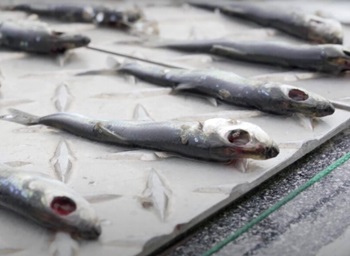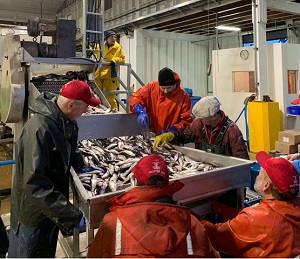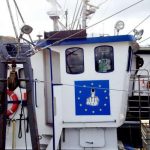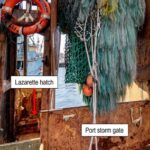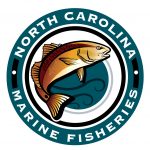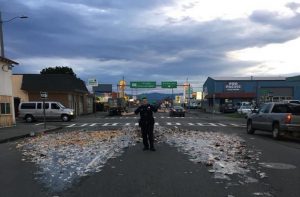Tag Archives: herring
Maine lobstermen worried about cuts to how much herring they can catch for bait
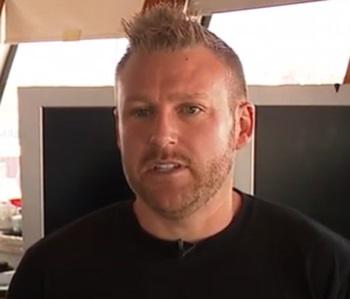 Fishermen in Maine say they’re dealing with a new setback: a nearly 90 percent cut in how much herring they can bring in to bait lobster. Congressman Jared Golden says he’s opposed to the limit, which would reduce the herring catch by 89 percent over three years. “What was troubling with this decision is there was no impact study done to us as fishermen, just an environmental study that was based on essentially one year of a proper study, to have implications to destroy an entire economic sector of Maine,” fisherman Ryan Raber said. Video, more, >>CLICK TO READ<< 06:19
Fishermen in Maine say they’re dealing with a new setback: a nearly 90 percent cut in how much herring they can bring in to bait lobster. Congressman Jared Golden says he’s opposed to the limit, which would reduce the herring catch by 89 percent over three years. “What was troubling with this decision is there was no impact study done to us as fishermen, just an environmental study that was based on essentially one year of a proper study, to have implications to destroy an entire economic sector of Maine,” fisherman Ryan Raber said. Video, more, >>CLICK TO READ<< 06:19
Lifelong Commercial Fisherman Army Veteran Theodore “Ted” Reed Merrell III, of Juneau, has passed away
 Theodore “Ted” Reed Merrell III, 76, died at his Fritz Cove home on October 16, 2024 after a long struggle with Progressive Supranuc Palsy (PSP). Ted and Lucy were engaged while Ted was on R&R in Hawaii and after discharge, they were married in Minnesota. They headed to Juneau as soon as Lucy graduated, driving Ted’s hot orange 1970 stick-shift Dodge Charger R/T. Ted soon got his own boat–an open 19-footer –and began a lifelong career in commercial fishing. Other boats followed: Diamondtooth (an ancient wooden gillnetter), Onni (a fast bowpicker with troublesome twin Volvo engines), Invictus, and for most of his career, the 45-foot Dundas. Ted had permits in many fisheries and tried crab, herring, and salmon gillnetting and finally settled into longlining and trolling, often accompanied by his son, Nelson. He fished all over the Northern Panhandle and especially liked downtime with friends in the fishing village, Elfin Cove. more, >>CLICK TO READ<< 15:44
Theodore “Ted” Reed Merrell III, 76, died at his Fritz Cove home on October 16, 2024 after a long struggle with Progressive Supranuc Palsy (PSP). Ted and Lucy were engaged while Ted was on R&R in Hawaii and after discharge, they were married in Minnesota. They headed to Juneau as soon as Lucy graduated, driving Ted’s hot orange 1970 stick-shift Dodge Charger R/T. Ted soon got his own boat–an open 19-footer –and began a lifelong career in commercial fishing. Other boats followed: Diamondtooth (an ancient wooden gillnetter), Onni (a fast bowpicker with troublesome twin Volvo engines), Invictus, and for most of his career, the 45-foot Dundas. Ted had permits in many fisheries and tried crab, herring, and salmon gillnetting and finally settled into longlining and trolling, often accompanied by his son, Nelson. He fished all over the Northern Panhandle and especially liked downtime with friends in the fishing village, Elfin Cove. more, >>CLICK TO READ<< 15:44
Tuna selling at a higher price for some local fishermen
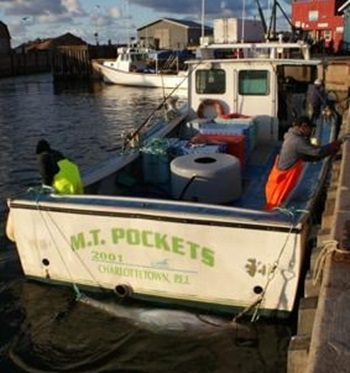 This year’s tuna season has been described as successful by some eastern PEI fishers. Allen Fay fishes out of North Lake. “There are lots of fish around,” he said. “They’re fetching a much better price than earlier years.” Fisherman Lucas Lesperance has had a similar season. “They’re definitely up in prices. It’s the same old story; supply and demand,” said Mr Lesperance. Fishing out of Naufrage, he has caught five tuna so far, the biggest of which being 490 lbs. “This year we were a little further offshore (to start), they were hanging around deeper waters but have moved closer with the bait,” he said. more, >>CLICK TO READ<< 10:35
This year’s tuna season has been described as successful by some eastern PEI fishers. Allen Fay fishes out of North Lake. “There are lots of fish around,” he said. “They’re fetching a much better price than earlier years.” Fisherman Lucas Lesperance has had a similar season. “They’re definitely up in prices. It’s the same old story; supply and demand,” said Mr Lesperance. Fishing out of Naufrage, he has caught five tuna so far, the biggest of which being 490 lbs. “This year we were a little further offshore (to start), they were hanging around deeper waters but have moved closer with the bait,” he said. more, >>CLICK TO READ<< 10:35
Herring stock struggles continue
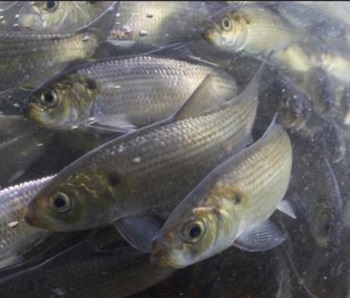 Herring stocks in the south of the Gulf of St. Lawrence continues to struggle as the federal moratorium on spring herring fishing passes the two-year mark. Herring in Atlantic Canada is split into two stocks, corresponding with the breeding cycles of the fish. While spring herring stocks protected by the moratorium continue to struggle, fall herring can be fished sustainably and are not under a moratorium. Herring is an ideal species for bait and is a favourite for crustacean fishers. With spring herring stocks under moratorium, fishers in Atlantic Canada are forced to turn to alternative fish stocks. Mark Prevost, one of three co-owners of the alternative bait company Bait Masters, feels strongly about sustainability and shared concerns with SaltWire about the future of other fish stocks taking the brunt of the herring stock closure. more, >>CLICK TO READ<< 12:23
Herring stocks in the south of the Gulf of St. Lawrence continues to struggle as the federal moratorium on spring herring fishing passes the two-year mark. Herring in Atlantic Canada is split into two stocks, corresponding with the breeding cycles of the fish. While spring herring stocks protected by the moratorium continue to struggle, fall herring can be fished sustainably and are not under a moratorium. Herring is an ideal species for bait and is a favourite for crustacean fishers. With spring herring stocks under moratorium, fishers in Atlantic Canada are forced to turn to alternative fish stocks. Mark Prevost, one of three co-owners of the alternative bait company Bait Masters, feels strongly about sustainability and shared concerns with SaltWire about the future of other fish stocks taking the brunt of the herring stock closure. more, >>CLICK TO READ<< 12:23
Fishing deals said to have netted £393 million for Scots’ fleet
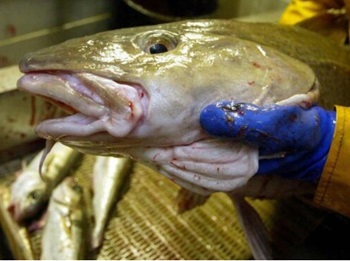 A trilateral agreement between the UK, European Union and Norway covers the total allowable catch (TAC) limits and management measures for jointly managed stocks in the Nort Sea. It has delivered quota increases for all six stocks – cod, haddock, whiting, plaice, saithe and herring. These are said to be worth an estimated £199m for Scots’ fishers, an increase of £68m compared to 2023 quotas. The government said this deal reflected positive advice from the International Council for the Exploration of the Sea, an influential group of marine scientists. It has delivered quota increases for all six stocks – cod, haddock, whiting, plaice, saithe and herring. Photos, more, >>click to read<< 14::56
A trilateral agreement between the UK, European Union and Norway covers the total allowable catch (TAC) limits and management measures for jointly managed stocks in the Nort Sea. It has delivered quota increases for all six stocks – cod, haddock, whiting, plaice, saithe and herring. These are said to be worth an estimated £199m for Scots’ fishers, an increase of £68m compared to 2023 quotas. The government said this deal reflected positive advice from the International Council for the Exploration of the Sea, an influential group of marine scientists. It has delivered quota increases for all six stocks – cod, haddock, whiting, plaice, saithe and herring. Photos, more, >>click to read<< 14::56
B.C. salmon farms linked to explosive spike in wild fish deaths
B.C. salmon farms killed more than 800,000 wild fish in 2022, 16 times more than the last decade’s yearly average, federal data shows. The unprecedented spike in aquaculture bycatch accounts for more dead fish in one year than the combined death toll over the previous 10 years. In one graphic example, video captured at a Cermaq facility in Clayoquot Sound shows herring floundering at the surface after getting sucked into a powerful machine meant to remove sea lice from farmed salmon. Stan Proboszcz, a senior scientist at Watershed Watch Salmon Society, said he has never seen anything like it. “All these herring that went through the hydrolicer had their eyes blown out,” Proboszcz said. “It’s horrific.” more, photos, >>click to read<< 18:07
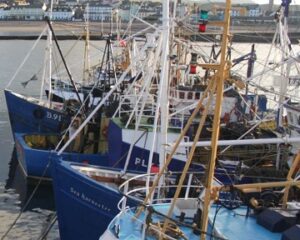
Brexit revives historic herring fishing after 25-year hiatus
The Isle of Man’s historic herring industry is being revived after a quarter of a century thanks to a post-Brexit deal with the UK over fishing quotas. The island’s fishermen will be able to land four times as many herring as before and will also be allowed to catch 235 tonnes of langoustines, worth a total of more than £2 million per year to the island’s economy. The Manx fishing industry was brought to its knees by the European Union Common Fisheries Policy, which placed strict limits on the size of catches in the 1980s. >click to read< 16:49
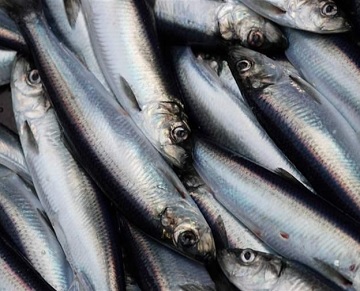
Herring fishermen get money after decline of fish, quota cuts
Fishermen in Maine’s historic herring fishing business will receive money from the federal government to help cope with a decline in the fish’s population that has caused the industry to struggle. The government has appropriated $7 million for the fishermen, the Maine Department of Marine Resources said Wednesday. Atlantic herring were found to be overfished via a 2020 scientific assessment, and fishing quotas were slashed after that. The nation’s catch of Atlantic herring has plummeted in the face of quota cuts and concern over the health of the stock. The loss of herring has led to a bait crunch for lobster fishermen, who have had to seek other sources of bait for traps. >click to read< 09:26
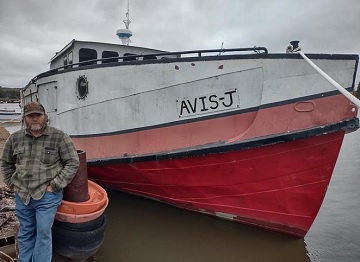
Everett’s Fisheries adds to fleet; Avis J comes aboard for 70th anniversary
For the past 70 years, the crews of the Everett’s Fisheries of Port Wing have plied the frigid waters of Lake Superior, wresting nets full of cisco chubs, lake trout, herring and whitefish from the big lake. A third generation of the Port Wing fishing clan established by Everett Johnson continues to fish and produce the smoked fish and Jeff Johnson intends to keep that tradition alive. To back up that determination, he recently purchased a new fishing boat, the Avis J, to add to Everett’s two-vessel fleet. Well, new to them at least. Photos, >click to read< 18:15
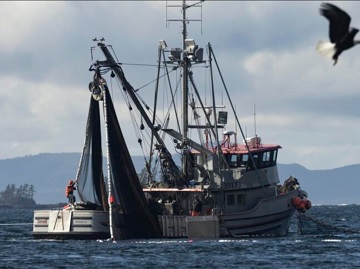
Alaska’s herring row
On a drizzly March afternoon in Sitka, Alaska, K’asheechtlaa “Louise” Brady hurries down a wooden ramp to the dock at Fisherman’s Quay, her gray-streaked hair spilling from the hood of her windbreaker. There, two small skiffs sit low in the water, heavy with 10-foot-long hemlock branches jeweled with yellow-white fish eggs. “Oh, they’re so beautiful!” “This is the taste of what it means to be Tlingit.” Jamie Ross stands on the deck of his seiner, F/V Anduril, next to a pile of dead herring, his shaggy white hair and mustache blowing in the wind. Ross, who’s from Homer, Alaska, has fished Sitka herring for 30 years. He’s one of the 47 permit holders, and one of the few who remember when herring fisheries lined the Alaska coast. Photos, >click to read< 13:29

Nova Scotia: Mackerel closure causes bait concerns as fishermen prepare for lobster season
Minister of Fisheries and Oceans (DFO) Joyce Murray announced on March 30 that there would be no directed commercial or bait fishing for southern gulf spring herring and a closure of the Atlantic mackerel commercial and bait fisheries this year in Atlantic Canada and Quebec. Guysborough County Inshore Fisherman’s Association Manager Ginny Boudreau’s first concern was about what was not covered in the DFO news release: loss of licences and lack of compensation. Those licenses have essentially been taken away from them…How you can just take thousands of licences out of the commercial fishery and not even a mention of that in the news release?… that’s huge,” >click to read< 08:41
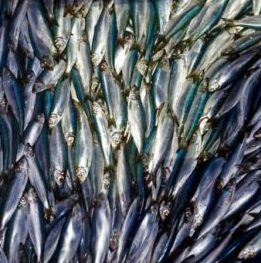
Bait Crisis: Lobstermen worry fishery closures will create bait supply issues
Last week, Fisheries and Oceans Canada shut down commercial harvesting of herring in the Gulf of St. Lawrence and Atlantic mackerel in Atlantic Canada and Quebec amid dwindling stocks. The two species are important sources of bait for the lobster industry. Some Island fishermen say they were caught off guard by the announcement as they prepare for setting day about a month from now. “It’s tough on fishermen because … we need the bait to fish lobster,” said Mallory Harris, who fishes in North Lake. Other fishermen said they’re already seeing the price of bait for lobster traps increase. >click to read< 08:14
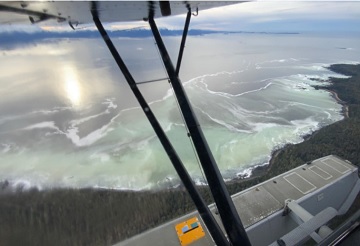
Sac roe herring fishery opens as first spawn is seen in Sitka Sound
The Sitka Sound sac roe herring fishery opened on Saturday, March 26. Seiners landed an estimated 450 tons of herring in 75 minutes of fishing, in beautiful weather along the eastern shoreline of Kruzof Island. The fishery moved into Hayward Strait on Sunday and was open for eight hours, from 11 a.m. until 7 p.m. As of press time, the total catch for the day has not been published. Matt Kinney is one of 47 permit holders in the fishery. “We have such a large GHL that we’ll never even come close to scratching the surface of actually processing what we’re allowed to catch,” Kinney said. >click to read< 13:57
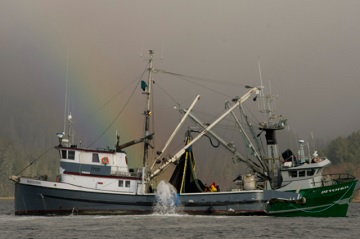
Fish Board mostly leaves Sitka herring alone following truce between users
After days of deliberation and a contentious set of proposals targeting the Southeast Alaska herring fisheries, the Alaska Board of Fisheries ultimately declined to make any major changes. To make attending the multi-week meeting easier for stakeholders, the board split the proposals into topics scheduled in three sessions, with herring first. There were 14 proposals dealing with herring from a variety of stakeholders, but the most contentious was were from the Sitka Tribe of Alaska and the Southeast Herring Conservation Alliance. The tribe’s proposals asked for a variety of changes to Sitka Sound herring management. The tribe’s main focus was to try to preserve more of the herring stock for subsistence use, but the commercial stakeholders say it would have come at the cost of the industry. >click to read< 15:15
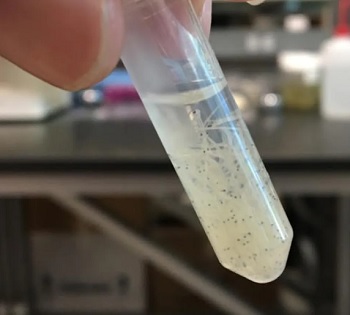
Scientists, First Nations team up in fresh attempt to revive struggling B.C. herring stocks
For decades, the fish were viewed as a virtually inexhaustible resource. They were canned, frozen, used as fertilizer, and even rendered into slippery goo to grease logs being skidded out of the forest. But the once coastal-wide bonanza is fizzling out. This year, most of the waters off B.C. were closed to commercial herring boats, with the only quota being allowed in the Strait of Georgia, along Canada’s southwest coast. The first collapse of the stocks happened in the 1960s, due to overfishing. They were allowed to recover but have had ups and downs in recent decades. The herring fishery in Eastern Canada has also been facing tough times. >click to read< 13:48
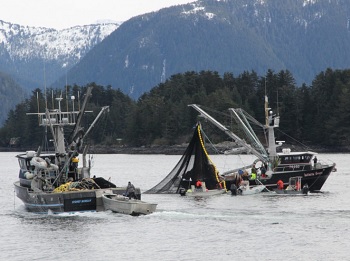
Sitka herring fishery opens for first time in 2 years
After a week on two-hour notice, the Sitka Sound sac roe herring fishery opened twice over the weekend. According to a release from the Alaska Department of Fish and Game, the fishery opened for 8 hours on Saturday. It re-opened on Sunday morning at 10:45 and closed at 6 p.m. Area management biologist Aaron Dupuis said seiners caught around 2,300 tons on Saturday, but he didn’t have data from Sunday’s harvest yet. He said the fleet is smaller this year, with around 20 seiners and four processors are participating. “It’s been pretty relaxed,” he said. “Just the size of the fleet. Everything is really tightly controlled. So it’s not the usual bumper boats, wild, shoot-out fishery a lot of people are accustomed to. It’s pretty relaxed out there.” >click to read< 13:30
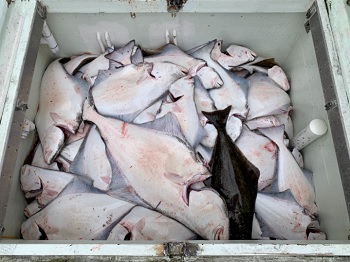
NOAA Fisheries reports on early pandemic impact on fisheries
NOAA Fisheries Friday, January 15 released a report on the economic impact on the seafood catch and recreational fishing nationwide and here in Alaska through last summer.,, Nationwide the commercial fishing industry started off 2020 with increases in revenue from seafood sales. But as the pandemic hit in March, that income dropped off 19 percent compared to the most recent five-year average. Those declines swelled to 45 percent by July. >click to read< 19:25
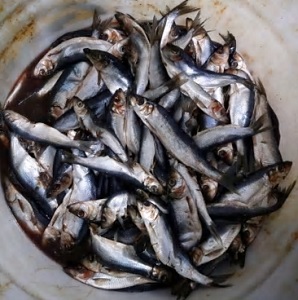
DFO report says Gulf of St. Lawrence herring that spawn in the spring in deep trouble
The grim projection was shared earlier this month by the Department of Fisheries and Oceans, just days before the spring herring fishery is set to open in Nova Scotia, New Brunswick, P.E.I. and Quebec. Predation is killing six of 10 older fish each year and a warming ocean is knocking down a critical food source for young. Spring spawners, as the population is called, have been in trouble for many years, but data gathered in 2018 and 2019 indicates very high levels of mortality, said Francois Turcotte,,, Seals, tuna and warm water, >click to read< 17:18
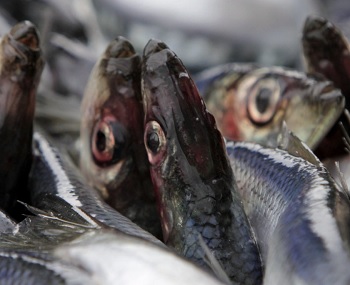
Canada’s high-stakes herring fishery gamble
This year, in response to an expected low herring return in the Strait of Georgia, Fisheries and Oceans drafted a plan to keep the harvest level at 20 per cent, the same level as when herring are abundant. Evidence over the past couple of years shows herring populations have fallen rapidly due to natural variation, which means precaution is required. The current assessment suggests there’s a one-in-four chance the stock will fall below the point when no fishing is permitted. Leading fisheries management agencies around the world have implemented rules for these types of scenarios to rein in the risk. Beginning this year, Fisheries and Oceans Canada must strive to do the same. >click to read< 15:50
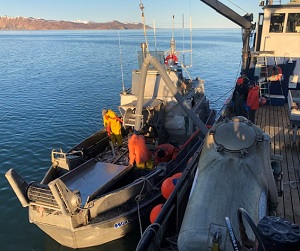
Fishermen participating in Alaska’s largest herring fishery have a huge quota to fill next year. But the primary customer isn’t buying.
“I’m a recovering herring fisherman,” joked Bruce Schactler. Schactler, who lives in Kodiak, has been fishing in Togiak off and on since 1985. But he won’t be returning this summer. “The market is so bad that Trident will not be buying fish this year, so we’re not going. Every ton that is frozen and shipped off to Japan is a loser. There’s no money being made,” he said. >click to read< 07:06

Video: Maine lobstermen look to Asian Carp as potential solution for bait crisis
“My bait bill today was ridiculously high, I think. But there’s people that spend more,” said Lobsterman Steve Train. The rising costs are credited to increased demand, but also new regulations that limit the catch for one of the most popular fish for lobstering – herring. “The reality is it’s not the just the price, it’s the availability. Without the herring coming on to put in the bait bags to catch lobsters… we’re going to have a bait shortage,” said Train. The state estimates a nearly a 50,000,000 pound herring gap in the next year. >Video, click to read< 11:19
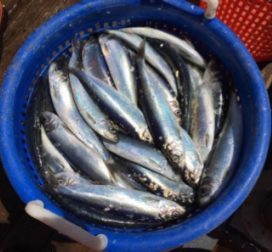
Fishermen’s Alliance: Long-Waged Battle for Herring Won
The formal announcement from the National Oceanic and Atmospheric Administration reflected what much of the Cape wanted, a 12-nautical mile territorial sea boundary from the Canadian border to Connecticut and a 20-mile buffer off the peninsula’s backshore as well as catch limits based on the needs of the ecosystem. Supporters believe the buffer that keeps industrial-sized midwater trawl vessels from taking enormous amounts of herring out of local waters will go a long way towards rebuilding the entire inshore ecosystem and therefore boost the maritime economy. >click to read< 10:10

Final stretch for herring protections
“After 10 years of debate, the New England Fishery Management Council has finally accepted the proposals favored by Cape communities and what would keep midwater trawls off our coast year round. It will have benefits for all our commercial and recreational fisheries and the nearshore ecosystem,” said John Pappalardo, chief executive officer of the Chatham-based Cape Cod Commercial Fishermen’s Alliance, which has worked to advance the rules. “This is it,” said Pappalardo. “We need people to speak out for herring one more time to make sure these important rules become a reality.” >click to read< 19:55

Does Pew win the Forage fish war for the enviro’s? Final Opportunity to Comment on Herring Protections
“After 10 years of debate, the New England Fishery Management Council has finally accepted the proposals favored by Cape communities and what would keep midwater trawls off our coast year round. It will have benefits for all our commercial and recreational fisheries and the nearshore ecosystem,” said John Pappalardo, chief executive officer of the Cape Cod Commercial Fishermen’s Alliance. The protections were vetted by the National Oceanic and Atmospheric Administration and were recently published on the Federal Register for final comment. “This is it,” said Pappalardo. >click to read< 15:55
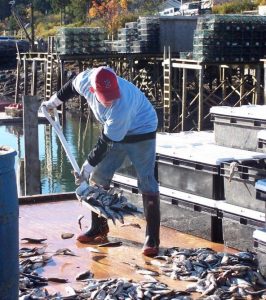
Herring cuts another headache for lobstermen
Maine lobstermen are catching it coming and going, but the “it” ain’t lobsters. Last month, the lobster industry found itself confronted with a demand from federal fisheries regulators that it reduce the risk it posed to endangered right whales by 60 percent and began the arduous task of figuring out how to remove half the vertical buoy lines attached to lobster traps from the water. Though it came as no surprise, earlier this month the New England Fishery Management Council announced that the already scant amount of herring allowed to be caught off the coast of New England would be further reduced in 2020 and 2021. >click to read<11:34

Atlantic Herring: Fishermen face another quota cut, could hit lobster prices
Regulators on the East Coast are contending with a drop in the population of herring, a key forage fish species that has been used as lobster bait for generations.,, A fishery management board is due to make a decision about the 2020 catch limits in early June.,, “I’ve heard from other fishermen up and down the coast, from Maine to Massachusetts. It’s going to be survival of the fittest,” Casoni said. “Every year is challenging, and every year just gets a little more.” >click to read<11:16

Atlantic Canadian herring fisheries lose sustainability label
All three Marine Stewardship Council-certified herring fisheries in Atlantic Canada have lost their MSC-sustainability certification as the forage fish continues to struggle. Last week, the Seafood Producers Association of Nova Scotia voluntarily suspended its MSC certification on behalf of the 10 companies that operate an 11-vessel fleet of herring purse seiners primarily out of southwestern Nova Scotia.,,, “Over the last three years, the stock has been experiencing a decline and recent science information suggests that the stock is likely now in the critical zone.”,,, Earlier this year, the 19-vessel purse seiner herring fishery off western Newfoundland, led by the Barry Group Inc. of St. John’s, withdrew from MSC certification after auditors warned it was taking too many,,,>click to read<11:06
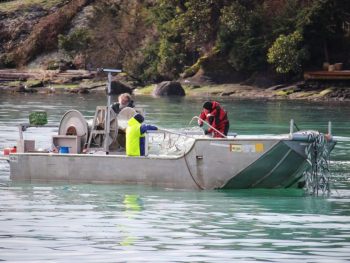
David MacKay – Strait to the source, a fisherman’s view of B.C.’s herring fishery
The herring fishery “war” in B.C., as referred to in a previous publication in the Tyee, began with a petition and has since devolved into a fight that pits conservationists against fishermen. This fight does nothing but create space between these two sides that blocks any opportunity for reasoned dialogue or conversation. Ian Gill’s article last month only serves to bolster this narrative. By painting conservationists as saints and fishermen as villains, you dehumanize the people and communities whose livelihoods, and indeed lives, have been built on responsible stewardship of our coast. >click to read<10:37
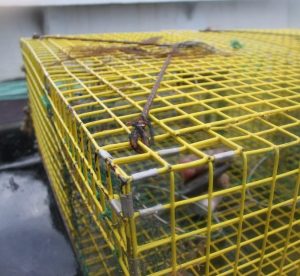
More crew means more opportunity for fishermen to make good
As interstate and federal agencies move to cut use of Maine’s chief bait source — herring — by 75 percent and put in new rules to protect right whales, many of us who have fished lobsters through good times and bad face some very scary times in the next couple of years if we do not figure out a way to get the most out of every trap we put in the water. There’s talk of a trap reduction, of reducing the amount of bait we use, even of closing off valuable fishing areas for part of the year to men and women who have fished Maine waters since they could barely see over the side of the boat. Each of these will hurt Maine’s blue-collar fishing families and the towns we live in without giving anyone much hope for the future. >click to read< by Rep. Billy Bob Faulkingham11:39






